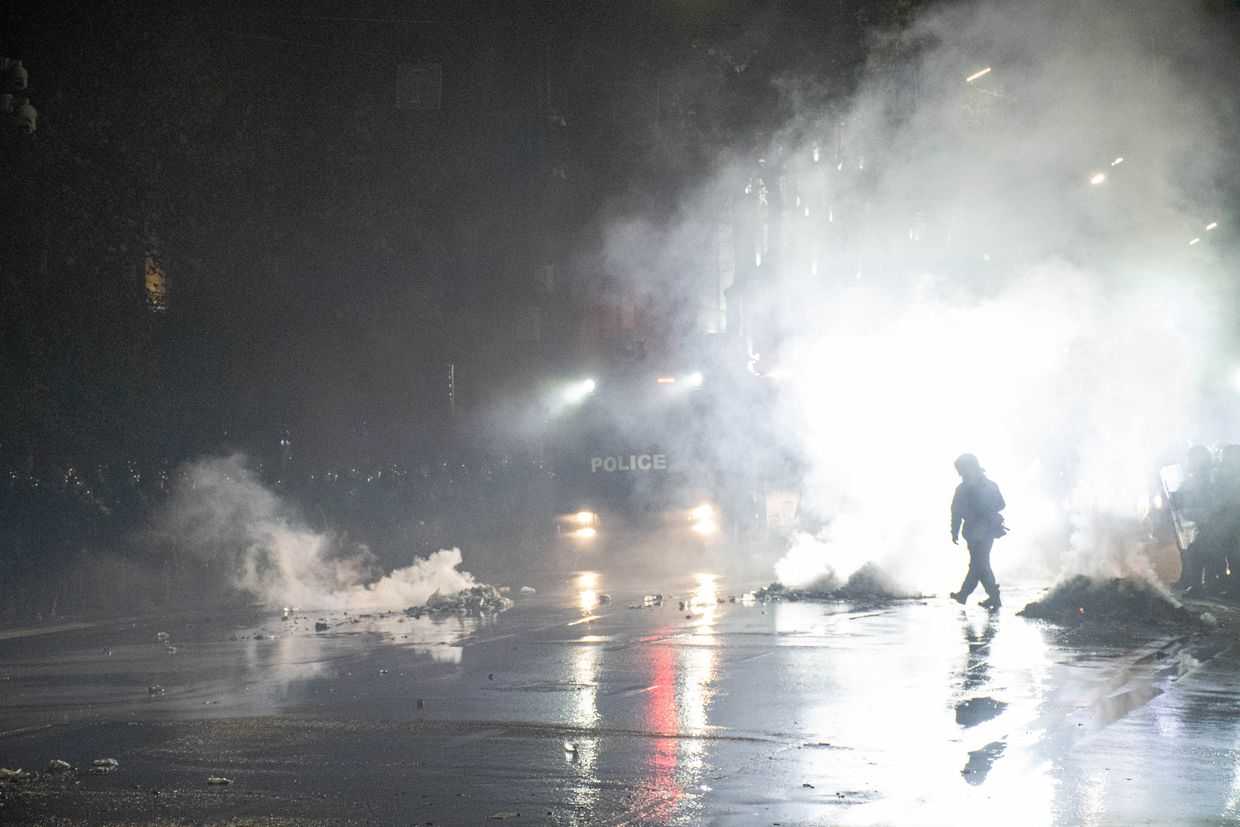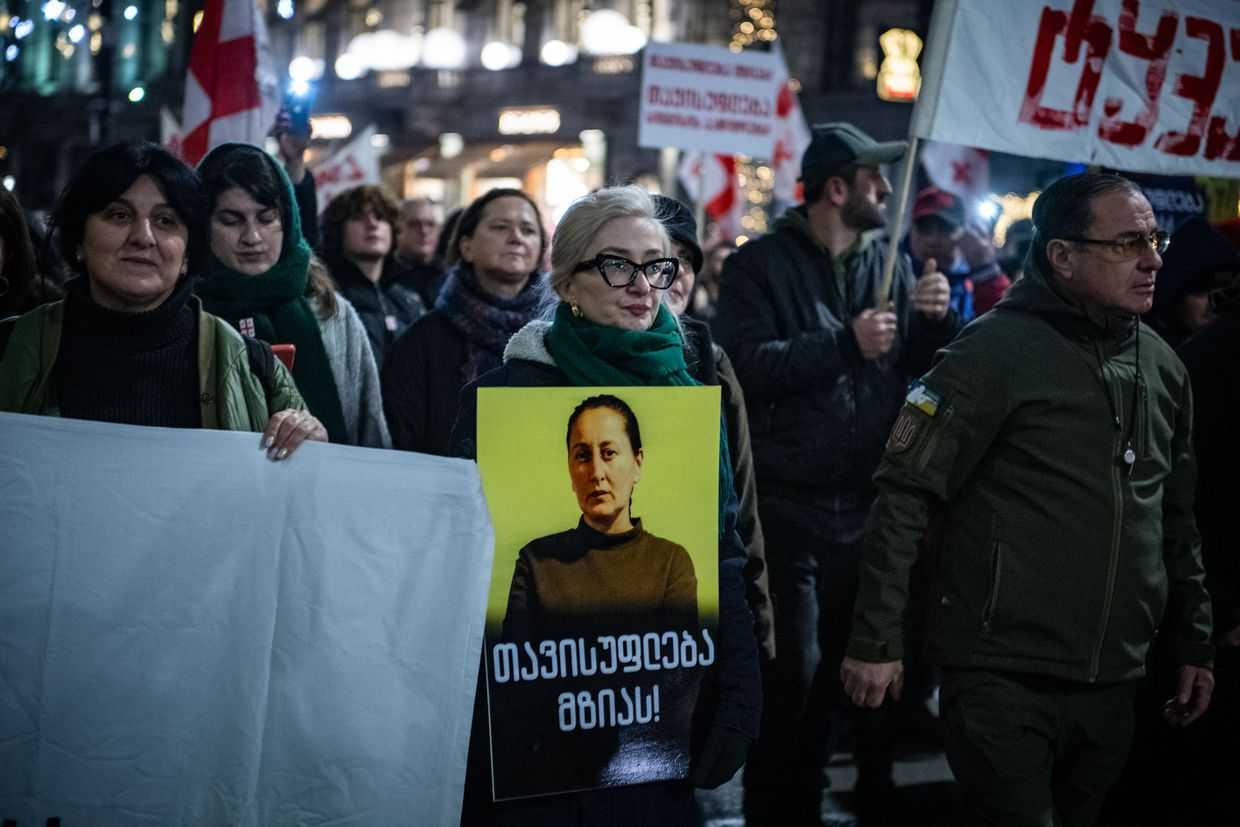
Georgia’s reintroduction of its foreign agent law has received a backlash internationally, with many warning it could torpedo the country’s potential EU membership.
The ruling Georgian Dream party reintroduced the bill on Wednesday despite previously promising not to revisit it. The party’s previous attempt to pass the law in March 2023 failed after two nights of mass protests in Tbilisi.
The law is identical to the 2023 version, except that it would label organisations that receive funding from foreign donors ‘organisations carrying out the interests of a foreign power’ instead of ‘agents of foreign influence’.
On Thursday, the European Union stated that the reintroduction of the draft law ‘raises serious concerns’.
‘The European Union recalls the public pledge of the Georgian government and the ruling party from last year to “unconditionally withdraw” such legislation’, they said in a statement. ‘The EU regrets that it is once again being considered despite strong public and international reactions in March 2023’.
The bloc suggested the move would endanger Georgia’s application for membership.
‘The EU recalls that the European Council granted Georgia candidate status on the understanding that the relevant steps set out in the Commission’s recommendation of 8 November 2023 are taken’, the EU stated, calling on the government to ‘uphold its commitment to promoting democracy, the rule of law, and human rights’.
‘Creating and maintaining an enabling environment for civil society organisations and ensuring media freedom is at the core of democracy. It is also crucial for the EU accession process.’
Viola von Cramon, a Member of the European Parliament also criticised the law, and accused Georgian Dream of following Russia’s ‘instructions’.
🇬🇪 @GeorgianDream41 got new instructions from their masters in the Kremlin. They are so uncreative that they reintroduced the same 🇷🇺 law that Georgian people said NO to.
This law has one goal – to sabotage Georgia’s European future. To keep 🇬🇪 in the Russian swamp. Bad idea.— Viola von Cramon 🇺🇦🇪🇺🇮🇱 (@ViolavonCramon) April 3, 2024
Another MEP, Miriam Lexmann, said Georgian Dream had once again proven it was ‘willing to sabotage Georgia’s European reform path’.
On the same day, the chair of the Foreign Affairs Committee of Latvia, Rihards Kols, wrote on X that ‘Georgia’s scales are once again tipped towards the Kremlin’.
On Friday, the chairs of the foreign affairs committees of the parliaments of 12 European countries criticised the law on foreign agents and expressed ‘deep concern about the content of this Putin’s Russia’s-style law, which is designed to stigmatise and weaken Georgia’s vibrant pro-European civil society and NGO sector’.
‘It is a hostile act against the Georgian people’s hard-won European aspirations, undermining all recent and future attempts to strengthen Euro-Atlantic integration’, they said.
The foreign ministries of Sweden, Norway and Estonia also criticised reintroducing the draft law.
Thomas Hacker, a Liberal German MP and a member of the German Parliament’s European Union Affairs Committee, also accused Georgian Dream of attempting to stifle civil society.
The Parliamentary Assembly of the Council of Europe (PACE) monitoring co-rapporteurs for Georgia, Claude Kern and Edite Estrela claimed on Friday that ‘there are serious questions about the draft law’s compatibility with European democratic and human rights standards and norms’.
‘We therefore urge the authorities to withdraw this draft from the parliamentary agenda’, they said.
The reintroduced bill also found condemnation in Washington on Wednesday. US State Department spokesperson Matthew Miller recalled that Georgians were able to force the ruling party to repeal the law last year.
‘I would just say that last year, tens of thousands of Georgians took to the streets to make their European ambitions known and to reject the last attempt to implement this law’, he said. ‘Georgia has a historic opportunity to open EU’s accession talks, and we stand ready to continue to support Georgia in that process.’
On Thursday, The UN Human Rights Office also warned the Georgian government that the bill ‘poses serious threats to freedoms of expression & association’ and called on authorities to withdraw it.
In the US Senate, Republican senator Jim Risch and Democratic senator Jeanne Shaheen issued a joint statement calling on Georgian Dream to drop the law.
‘Not only would this draft law lead the political process in the wrong direction, but it would harm Georgia’s transatlantic integration and its future in the European Union’, they stated.
At a meeting of NATO Foreign Ministers on Thursday, Secretary General Jens Stoltenburg said he opposed the government’s attempt to reintroduce the legislation ‘because this will actually contradict the whole effort to strengthen the democratic institutions in Georgia’.
‘Georgia should work on reforms to move closer to NATO and the European Union, and the European Union has been very clear about this’, he continued.
On Wednesday, Reporters Without Borders (RSF) likened the bill to a draft law signed in Kyrgyzstan the day prior to Georgian Dream’s reintroduction of the law.
‘This bill, largely inspired by Russian foreign agents law, poses a serious threat to press freedom in Georgia and to its European path’, an RSF spokesperson told OC Media.
‘In Russia, today, the media register of “foreign agents” now includes almost 300 names (individuals or legal entities)… We hope that Georgian authorities won’t take the path of intimidation and censorship and we call the Georgian Dream Party to withdraw the text — definitively.’
During last year’s protests, critics of the legislation dubbed it the ‘Russian law’, due to its similarity to legislation used to crush civil society and dissent in Russia.
On Wednesday, Parliamentary Speaker Shalva Papuashvili threatened to switch off the microphones of MPs who referred to it as the ‘Russian law’.
‘I will not allow anti-Georgian propaganda and this narrative in here’, said Papuashvili in session.
The speaker of the Georgian parliament has threatened to turn off the microphone of any MP who refers to the government’s foreign agent law as the ‘Russian law’.
📰 Read more on the new foreign agent law: https://t.co/Z7GJPhXnNk pic.twitter.com/yhI2OvbaRt
— OC Media (@OCMediaorg) April 3, 2024
On Thursday, Kremlin spokesperson Dmitri Peskov criticised parallels made between Georgian Dream’s foreign agents law and Russia’s own legislation, stating that ‘no sovereign state wants interference from other countries in its internal politics’.
The legislation would label any civil society or media organisation that received at least 20% of its funding from outside Georgia ‘organisations carrying out the interests of a foreign power’. Such organisations would be subject to ‘monitoring’ by the Ministry of Justice every six months, which lawyers have warned could include forcing them to hand over internal communications and confidential sources. Organisations that do not comply would be subject to large fines.









